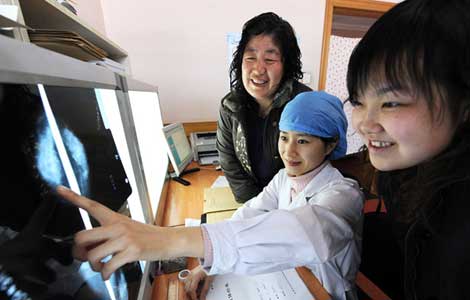The best medicine is early detection
Updated: 2013-08-28 07:59
By Wang Hongyi in Shanghai (China Daily)
|
||||||||
Experts are calling for better early detection of cervical cancer, which has become increasingly common among young women in recent years.
The age of women developing cervical cancer has lowered, says Wu Xiaohua, a professor at the Department of Gynecologic Oncology of Shanghai Cancer Hospital affiliated to Fudan University.
"In the past, cervical cancer mainly occurred in people aged 55 and above, but now, people aged between 25 and 45 are also a major group," Wu says.
Wu says cervical cancer is connected to sexual activity.
Chinese people's attitude toward sex has changed in recent years. The age of first sexual experience has also lowered, according to a survey by the news portal Sohu.com this year.
The survey, conducted among 94,000 people, shows the average age of first sexual experience among people who were born in the 1970s is 22.4, people born in the 1980s is 21.3, and people born in the 1990s is 18.2.
According to sources from the accidental pregnancy hotline for teenagers in Shanghai, the age of young people's first sexual experience has significantly lowered. There, the average age of first sexual experience among people born in the 1990s is 18.6.
Experts note that the younger people have sex, the higher of the risk of cervical cancer.
The center for disease control and prevention in Ningbo, Zhe-jiang province, reported a 14-year-old diagnosed with cervical cancer. She is the youngest cervical cancer patient in China, local Chinese media reported earlier this year.
"Public education is the focus of efforts to help women be aware of the disease, especially in rural areas," Wu says. "Many patients are diagnosed in an advanced stage of the disease because of a lack of knowledge."
In 2012, the Chinese government announced it would extend its program providing free cervical and breast cancer screenings to rural women for another three years. In 2012 alone, about 10 million rural women were offered cervical cancer screenings.
The program, started in 2009, has given 11.69 million rural women free cervical cancer tests in about 200 counties nationwide over the past three years.
Other screening projects focusing on floating population groups have also been carried out.
In addition to the screening projects targeting various groups, experts are also calling for efforts to establish a nationwide free screening plan to reach more women.
wanghongyi@chinadaily.com.cn
(China Daily USA 08/28/2013 page 9)

 Five apps to help you 'breathe' in Beijing
Five apps to help you 'breathe' in Beijing
 Wozniacki survives battle with Chinese qualifier
Wozniacki survives battle with Chinese qualifier
 Moscow air show opens with flight demonstrations
Moscow air show opens with flight demonstrations
 US preparing for probable strike on Syria
US preparing for probable strike on Syria
 Putting money on full moon
Putting money on full moon
 Language list aims to pass on Chinese culture
Language list aims to pass on Chinese culture
 Cancer patient delivers healthy baby
Cancer patient delivers healthy baby
 Chinese navy starts escort mission at Gulf of Aden
Chinese navy starts escort mission at Gulf of Aden
Most Viewed
Editor's Picks

|

|

|

|

|

|
Today's Top News
US envoy to visit DPRK to secure prisoner's release
US 'must consider impact' of winding down QE
China gearing up for plenary session
Japan suspends rocket launch at last minute
Global expertise a scarce asset for employers
Sino-Japanese meeting at G20 ruled out
New time limits for visa processing
Trending news across China
US Weekly

|

|







